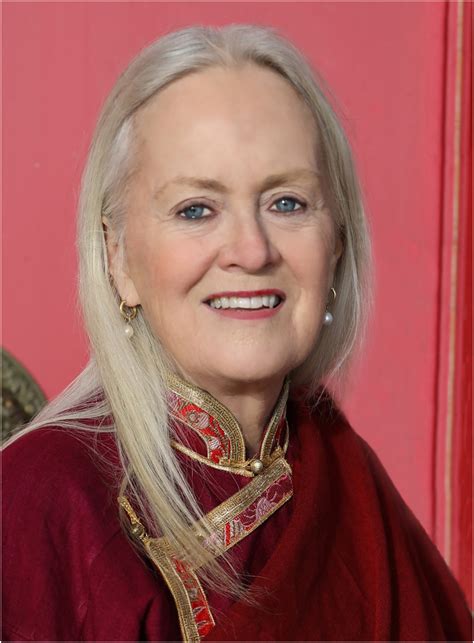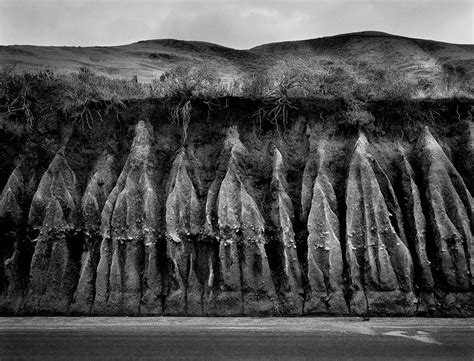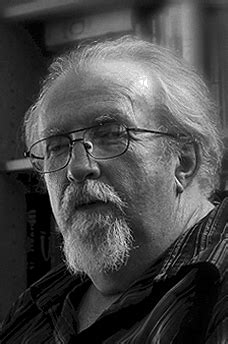Top 266 Luminous Quotes & Sayings - Page 5
Explore popular Luminous quotes.
Last updated on December 4, 2024.
The morning woods were utterly new. A strong yellow light pooled beneath the trees; my shadow appeared and vanished on the path, since a third of the trees I walked under were still bare, a third spread a luminous haze wherever they grew, and another third blocked the sun with new, whole leaves. The snakes were out - I saw a bright, smashed one on the path - and the butterflies were vaulting and furling about; the phlox was at its peak, and even the evergreens looked greener, newly created and washed.
I thought the earth remembered me, she took me back so tenderly, arranging her dark skirts, her pockets full of lichens and seeds. I slept as never before, a stone on the river bed, nothing between me and the white fire of the stars but my thoughts, and they floated light as moths among the branches of the perfect trees. All night I heard the small kingdoms breathing around me, the insects, and the birds who do their work in the darkness. All night I rose and fell, as if in water, grappling with a luminous doom. By morning I had vanished at least a dozen times into something better.
Gus: "It tastes like..." Me: "Food." Gus: "Yes, precisely. It tastes like food, excellently prepared. But it does not taste, how do I put this delicately...?" Me: "It does not taste like God Himself cooked heaven into a series of five dishes which were then served to you accompanied by several luminous balls of fermented, bubbly plasma while actual and literal flower petals floated down around your canal-side dinner table." Gus: "Nicely phrased." Gus's father: "Our children are weird." My dad: "Nicely phrased."
Billy Pilgrim says that the Universe does not look like a lot of bright little dots to the creatures from Tralfamadore. The creatures can see where each star has been and where it is going, so that the heavens are filled with rarefied, luminous spaghetti. And Tralfamadorians don't see human beings as two-legged creatures, either. They see them as great millepedes - "with babies' legs at one end and old people's legs at the other," says Billy Pilgrim.
Nature proceeds by blunders; that is its way. It is also ours. So if we have blundered by regarding consciousness as a blunder, why make a fuss over it? Our self-removal from this planet would still be a magnificent move, a feat so luminous it would bedim the sun. What do we have to lose? No evil would attend our departure from this world, and the many evils we have known would go extinct along with us. So why put off what would be the most laudable masterstroke of our existence, and the only one?
This time Magnus answered it, his voice booming through the tiny entryway. "WHO DARES DISTURB MY REST?" Jace looked almost nervous. "Jace Wayland. Remember? I'm from the Clave." "Oh, yes." Magnus seemed to have perked up. "Are you the one with the blue eyes?" "He means Alec," Clary said helpfully. "No. My eyes are usually described as golden," Jace told the intercom. "And luminous." "Oh, you're that one." Magnus sounded disappointed. If Clary hadn't been so upset, she would have laughed. "I suppose you'd better come up.
Through luminous and erudite readings of the texts, Hasana Sharp shows us how profound and radical is Spinoza's conception of nature and his claim that humans always remain part of nature, acting solely according to the same rules. She demonstrates the political consequences of adopting this perspective through a provocative intervention in contemporary feminist theory, while along the way opening promising avenues for future work in a variety of other fields, such as animal studies and ecology. This is a challenging and important book.
At physical death man loses his consciousness of the flesh and becomes conscious of his astral body in the astral world. Thus physical death is astral birth. Later, he passes from the consciousness of luminous astral birth to the consciousness of dark astral death and awakens in a new physical body. Thus astral death is physical birth. These recurrent cycles of physical and astral encasements are the ineluctable destiny of all unenlightened men.
However gross a man may be, the minute he expresses a strong and genuine affection, some inner secretion alters his features, animates his gestures, and colors his voice. The stupidest man will often, under the stress of passion, achieve heights of eloquence, in thought if not in language, and seem to move in some luminous sphere. Goriot's voice and gesture had at this moment the power of communication that characterizes the great actor. Are not our finer feelings the poems of the human will?
Normally we empower our demons by believing they are real and strong in themselves and have the power to destroy us. As we fight against them, they get stronger. But when we acknowledge them by discovering what they really need, and nurture them, our demons release their hold, and we find that they actually do not have power over us. By nurturing the shadow elements of our being with infinite generosity, we can access the state of luminous awareness and undermine ego. By feeding the demons, we resolve conflict and duality, finding our way to unity.
If you are a meditator, as your meditation goes on becoming more and more luminous, your intelligence will be growing to the last breath of your life. Not only that, even after the last breath your intelligence will continue to grow - because you are not going to die, only your body will be dying. And the body has nothing to do with intelligence, mind has nothing to do with intelligence. Intelligence is the quality of your awareness - more aware, more intelligent. And if you are totally aware, you are as intelligent as this whole existence is.
Your eyes, accustomed to semi-darkness, will soon open to more radiant visions of light. The shadows which we shall paint shall be more luminous than the high-lights of our predecessors, and our pictures, next to those of the museums, will shine like blinding daylight, compared with deepest night. We conclude that painting cannot exist today without divisionism... ...Divisionism, for the modern painter, must be an innate complementariness which we declare to be essential and necessary.
In the neuter austerity of that terrain all phenomena were bequeathed a strange equality and no one thing nor spider nor stone nor blade of grass could put forth claim to precedence. The very clarity of these articles belied their familiarity, for the eye predicates the whole on some feature or part and here was nothing more luminous than another and nothing more enshadowed and in the optical democracy of such landscapes all preference is made whimsical and a man and a rock become endowed with unguessed kinship.
Remember that in ascending to the Father You could not leave us orphans; And in making yourself a prisoner on earth You knew to veil all your divine rays. But the shadow of your veil is luminous and pure. Living Bread of faith, Celestial Food, O mystery of love! My daily Bread, Jesus, is You!... Jesus, it is you who, despite the blasphemies Of the enemies of the Sacrament of love, It is you who want to show how much you love me, Since you make your dwelling in my heart. O Bread of the exiled! Holy and Divine Host, It is no longer I who live, but I live on your life
For, after all, every one who wishes to gain true knowledge must climb the Hill Difficulty alone, and since there is no royal road to the summit, I must zigzag it in my own way. I slip back many times, I fall, I stand still, I run against the edge of hidden obstacles, I lose my temper and find it again and keep it better, I trudge on, I gain a little, I feel encouraged, I get more eager and climb higher and begin to see the widening horizon. Every struggle is a victory. One more effort and I reach the luminous cloud, the blue depths of the sky, the uplands of my desire.
Euclid alone has looked on Beauty bare. Let all who prate of Beauty hold their peace, And lay them prone upon the earth and cease To ponder on themselves, the while they stare At nothing, intricately drawn nowhere In shapes of shifting lineage; let geese Gabble and hiss, but heroes seek release From dusty bondage into luminous air. O blinding hour, O holy, terrible day, When first the shaft into his vision shone Of light anatomized! Euclid alone Has looked on Beauty bare. Fortunate they Who, though once only and then but far away, Have heard her massive sandal set on stone.
Her heart felt as if it were breaking in her breast, bleeding and bleeding, young and fierce. From grief over the warm and ardent love which she had lost and still secretly mourned; from anguished joy over the pale, luminous love which drew her to the farthest boundaries of life on this earth. Through the great darkness that would come, she saw the gleam of another, gentler sun, and she sensed the fragrance of the herbs in the garden at world's end.
Remember, until you become a buddha you have wasted your life. Buddhahood is your flowering, your fragrance. A tree is fulfilled when it blooms, and a man is fulfilled when he releases the fragrance of buddhahood, when he becomes luminous; then he comes to know who he is. In knowing that, all is known. In knowing that, God is known. In knowing that, truth is achieved - you become the truth, and truth liberates. Truth is freedom.
As I became aware that all things have unique spatial and temporal qualities which visually define and relate them, I began to perceive the things I was photographing not as objects but as events. Working to develop my skills of perceiving and symbolizing these event qualities, I discovered the principle of opposites. When, for example, I photographed the smooth, luminous body of a woman behind a dirty cobwebbed window, I found that the qualities of each event were enhanced and the universal forces which they manifested were more powerfully evoked.
The moment our discourse rises above the ground-line of familiar facts, and is inflamed with passion or exalted thought, it clothes itself in images. A man conversing in earnest, if he watch his intellectual processes, will find that always a material image, more or less luminous, arises in his mind, contemporaneous with every thought, which furnishes the vestment of the thought.... This imagery is spontaneous. It is the blending of experience with the present action of the mind. It is proper creation.
Imagination transforms one substance into another. It changes what is into what might be, what was into what might have been. Straw becomes gold, gold straw, and neither is more real nor, I submit, more precious than the other. Pebbles turn into luminous pearls and pearls into little gray rocks, both solid and beautiful, both essential. Human beings take shape from clay, angels' wings are spun out of water, fire gives rise to the long tongues of demons, love emerges out of thin air, and the basic elements reconstitute themselves again and again.
There is in life only one moment and in eternity only one. It is so brief that it is represented by the fleeting of a luminous mote through the thin ray of sunlight - and it is visible but a fraction of a second. The moments that preceded it have been lived, are forgotten and are without value; the moments that have not been lived have no existence and will have no value except in the moment that each shall be lived. While you are asleep you are dead; and whether you stay dead an hour or a billion years the time to you is the same.
Cristina Eisenberg weaves her observations as a scientist and her personal experiences afield into a resonant account about the web of life that links humans to the natural world. Grounded in best science, inspired by her intimate knowledge of the wolves she studies, she offers us a luminous portrait of the ecological relationships that are essential for our well-being in a rapidly changing world. The Wolf's Tooth calls for a conservation vision that involves rewilding the earth and honoring all our relations.
Early morning, the orange sun is slowly rising, shining forth in empty luminous clarity. The mind and the sky are one, the sun is rising in the vast space of primordial awareness, and there is just this. Yasutani Roshi once said, speaking of satori, that it was the most precious realization in the world, because all the great philosophers had tried to understand ultimate reality but had failed to do so, yet with satori or awakening all of your deepest questions are finally answered: it's just this.
Love is the air that I breathe, like oxygen. When I lack it, I feel atrophied, asphyxiated. When I have it, I feel I am growing. And so this growth is linked to others, or to a collective other. If I realize that I do not love you, my faith diminishes, and I breathe less and less of the oxygen of life. When I feel linked to you, in communion with you, there is a current of love that passes between us, and the intensity can multiply. And the more this love grows, the more the faith becomes luminous, the more I feel linked to the collective other. I am speaking of God.
We may say that feelings have two kinds of intensity. One is the intensity of the feeling itself, by which loud sounds are distinguished from faint ones, luminous colors from dark ones, highly chromatic colors from almost neutral tints, etc. The other is the intensity of consciousness that lays hold of the feeling, which makes the ticking of a watch actually heard infinitely more vivid than a cannon shot remembered to have been heard a few minutes ago.
























